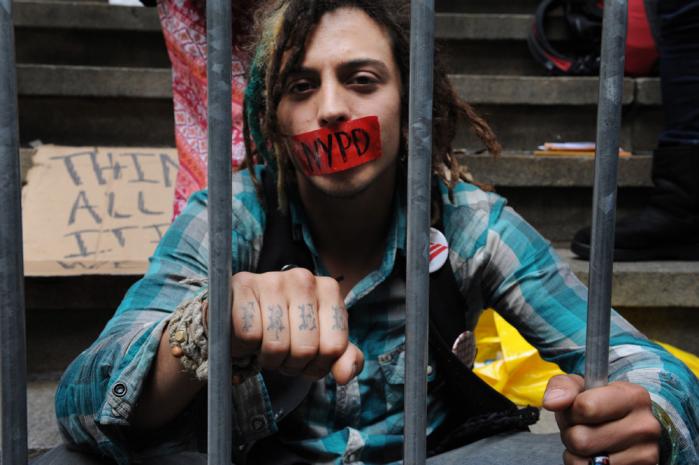-
Members of Occupy Wall Street slumber on the corner of Wall Street in the shadow of the New York Stock Exchange.
-
Members of Occupy Wall Street slumber on the corner of Wall Street in the shadow of the New York Stock Exchange.
-
Federal police consult the new rules for Federal Hall steps to see if Occupy Wall Street is in compliance.
-
Members of Occupy Wall Street slumber on the corner of Wall Street in the shadow of the New York Stock Exchange.
-
NYPD officers clear the sidewalk in front of Occupy Wall Street's latest encampment on the Federal Hall steps, adjacent to the New York Stock Exchange on Wall Street.
-
Occupy Wall Street participates in their weekly "Spring Training" march in the shadow of the New York Stock Exchange on April 13. There were five arrests. Later, as occupiers hunkered down for the evening, the NYPD forced some of them to remove their gear, resulting in two additional arrests.
-
An Occupy Wall Street protester talks to some curious businessmen from the area in the shadow of the New York Stock Exchange.
-
Ten Occupy Wall Street protesters perform an act of civil disobedience to call attention to the no-sleeping rule on the Federal Hall steps adjacent to the New York Stock Exchange on Wall Street.
-
Federal police present a document listing the new rules for Occupy Wall Street's latest encampment on the Federal Hall steps adjacent to the New York Stock Exchange on Wall Street.
-
Occupy Wall Street defends its latest encampment on the Federal Hall steps adjacent to the New York Stock Exchange on Wall Street.
-
Occupy Wall Street defends its latest encampment on the Federal Hall steps adjacent to the New York Stock Exchange on Wall Street.
-

Mayhem, aka Jack, inside the "Freedom Cage" as Occupy Wall Street defends its latest encampment on the Federal Hall steps adjacent to the New York Stock Exchange on Wall Street.
Stephanie Keith, originally trained as a painter and anthropologist, began her photography career after attending the International Center for Photography in New York City.
“Sitting at home with my kids on September 18, I saw the news stories about the pepper spray incident on the protest march," she recalled. "Pepper spray? Protest march? What protest? The moment I heard about this new protest, I was down at Zuccotti with my cameras, impressed that people would give up so much: jobs, relationships, apartments and security to be present for this protest. Just getting back into editorial/news photography after a maternity leave, I decided to go “all in” with documenting the Occupy protest.
"Sitting in my jail cell after being arrested on the Brooklyn Bridge, I had time to think about Occupy. Storming the Brooklyn Bridge roadway, we all felt for a brief invigorating moment that this protest was different, that our collective voices were being heard. While photographing the event, I had not intended to get arrested. As a press photographer, I thought arrest was not an option. Still wading into the Occupy Wall Street movement, I came away from that day with a new level of commitment, irreversibly involved in the eruption of a movement.
"At this point, I’ve practically become a regular at any of the Direct Actions or happenings with Occupy Wall Street. As mainstream media coverage has abated, mine has not. In the winter, when many people had written off Occupy, I knew there were hundreds of committed activists working on it day and night. I photographed the New Year’s party in Zuccotti. I was with the occupiers as they were evicted from Zuccotti on the six-month anniversary in March and went with them to occupy Union Square. I’ve visited them sleeping on Wall Street. Wherever they go, my cameras follow."
Previous to documenting the Occupy Wall Street protest, Stephanie’s work has been published in The New York Times, Rolling Stone, Time Magazine and NPR, among others. She's trained her lens on Evangelical teenagers, Muslim life in New York City and Haitian-American Vodou ceremonies in Brooklyn. Stephanie’s Vodou work has been published as a book, Vodou Brooklyn, published by the Caribbean Studies Press.
3 WAYS TO SHOW YOUR SUPPORT
- Log in to post comments











